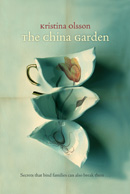

University of Queensland Press, paperback, 9780702236976
The China Garden's opening chapter marks the bookends of life—birth and death. A newborn baby is discovered, abandoned, and ageing artist Angela dies. Also, Angela's daughter, Laura, finds that she has a brother who was adopted out, and so we wait for two possible reunions: baby and mother, brother and sister.
Olsson has chosen to tell this story mainly through two tangential characters—Kieran and his grandmother Cress. Kieran is in his thirties, works part-time and is obsessed with TV quiz shows. His night-time wanderings lead him to Angela's studio and by the time she dies Kieran is her closest friend. Affected by some disorder—perhaps a form of Asperger's—Kieran roams the town, blithely noting sunny days, small miracles of nature and beauty in the mundane:
Cress is a widow and not entirely happy with her life. She ponders the mysteries of life and death and human behaviour.
Then there is Laura who has returned to Australia from France to settle her mother's affairs. Estranged from Angela for several years, Laura also wants to understand the mother she has lost and find some sign that she, Laura, was loved.
Each character is well-developed, and we come to accept their doubts, their flaws and their strengths. Kieran is especially endearing. It is perhaps the fourth, silent character which I came to love most of all—the physical environment. The Australian bush and the coastline weave their own spell:
Olsson's prose is lovely and The China Garden is ultimately life-affirming. Everywhere there is
beauty—in the writing, in the characters, in the setting, and in the ordinary business of living.
